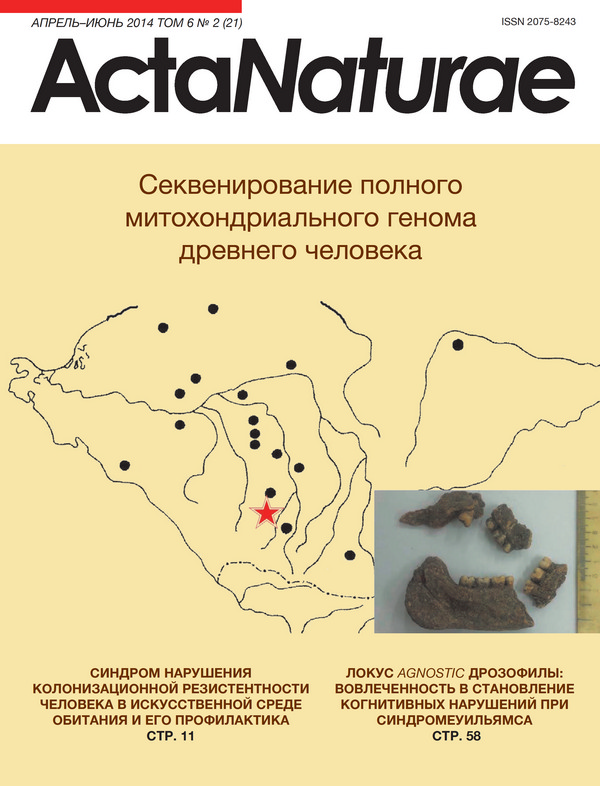The Drosophila agnostic Locus: Involvement in the Formation of Cognitive Defects in Williams Syndrome
- Authors: Nikitina Е.А.1,2, Medvedeva A.V.1,3, Zakharov G.А.1,3, Savvateeva-Popova Е.V.1,3
-
Affiliations:
- Pavlov Institute of Physiology RAS
- Herzen State Pedagogical University
- Saint-Petersburg State University
- Issue: Vol 6, No 2 (2014)
- Pages: 53-61
- Section: Research Articles
- URL: https://actanaturae.ru/2075-8251/article/view/10550
- DOI: https://doi.org/10.32607/20758251-2014-6-2-53-61
- ID: 10550
Cite item
Abstract
The molecular basis of the pathological processes that lead to genome disorders is similar both in invertebrates and mammals. Since cognitive impairments in Williams syndrome are caused by LIMK1 hemizygosity, could the spontaneous and mutant variants of the Drosophila limk1 gene serve as a model for studying two diagnostic features from three distinct cognitive defects of the syndrome? These two symptoms are the disturbance of visuospatial orientation and an unusualy strong fixation on the faces of other people during pairwise interaction with a stranger. An experimental approach to the first cognitive manifestation might be an analysis of the locomotor behavior of Drosophila larvae involving visuospatial orientation during the exploration of the surrounding environment. An approach to tackle the second manifestation might be an analysis of the most natural ways of contact between a male and a female during courtship (the first stage of this ritual is the orientation of a male towards a female and following the female with constant fixation on the female’s image). The present study of locomotor activity and cognitive repertoire in spontaneous and mutant variants of the Drosophila agnostic locus allows one to bridge alterations in the structure of the limk1 gene and behavior.
Keywords
About the authors
Е. А. Nikitina
Pavlov Institute of Physiology RAS; Herzen State Pedagogical University
Author for correspondence.
Email: 21074@mail.ru
Russian Federation
A. V. Medvedeva
Pavlov Institute of Physiology RAS; Saint-Petersburg State University
Email: 21074@mail.ru
Russian Federation
G. А. Zakharov
Pavlov Institute of Physiology RAS; Saint-Petersburg State University
Email: 21074@mail.ru
Russian Federation
Е. V. Savvateeva-Popova
Pavlov Institute of Physiology RAS; Saint-Petersburg State University
Email: 21074@mail.ru
Russian Federation
References
- Bellugi U., Adolphs R., Cassady C., Chiles M. // Towards the neural basis for hypersociability in a genetic syndrome // Neuroreport. 1999, V.10, №8, P.1653-1657
- Järvinen-Pasley A., Bellugi U., Reilly J., Mills D.L., Galaburda A., Reiss A.L., Korenberg J.R. // Defining the social phenotype in Williams syndrome: a model for linking gene, the brain, and behavior // Dev. Psychopathol. 2008, V.20, №1, P.1-35
- Pober B.R., Johnson M., Urban Z. Mechanisms and treatment of cardiovascular disease in Williams-Beuren syndrome. // Mechanisms and treatment of cardiovascular disease in Williams-Beuren syndrome // J. Clin. Invest. 2008, V.118, №5, P.1606-1615
- Savvateeva E.V., Kamyshev N.G., Rosenblum S.R. // Receiving of temperature-sensitive mutations involving cyclic adenosine-3’,5’-monophosphate metabolism in Drosophila melanogaster // DAS USSR. 1978, V.240, P.1443-1445
- Savvateeva E.V., Kamyshev N.G. // Behavioral effects of temperature-sensitive mutations affecting metabolism of cAMP in D. melanogaster // Pharmacology, Biochemistry & Behavior. 1981, V.14, P.603-611
- Savvateeva-Popova E.V., Peresleny A.I., Scharagina L.M., Tokmacheva E.V., Medvedeva A.V., Kamyshev N.G., Popov A.V., Ozersky P.V., Baricheva E.M., Karagodin D. // Complex study of Drosophila mutants in the agnostic locus: a model for connecting chromosomal architecture and cognitive functions // J. Evol. Biochem. Physiol. 2002, V.38, №6, P.706-733
- Savvateeva-Popova E.V., Peresleni A.I., Sharagina L.M., Medvedeva A.V., Korochkina S.E., Grigorieva I.V., Dyuzhikova N.A., Popov A.V., BarichevaE.M. I.O., Karagodin D. // Architecture of the X Chromosome, Expression of LIM Kinase 1 and Recombination in the agnostic Mutants of Drosophila: A Model for Human Williams Syndrome // Rus. J. of Genet. 2004, V.40, №6, P.605-624
- Medvedeva A.V., Molotkov D.A., Nikitina E.A., Popov A.V., Karagodin D.A., Baricheva E.M., Savvateeva-Popova E.V. // Systemic regulation of genetic and cytogenetic processes by a signal cascade of ac-tin remodeling: locus agnostic in Drosophila // Rus. J. of Genet. 2008, V.44, №6, P.771-783
- Bragina Y.V., Molotova N.G., Kamysheva E.A., Soboleva S.A., Kamyshev N.G. // Identification of Drosophila genes showing late maternal effect // VOGiS Herald. 2007, V.11, №2, P.436-444
- Kamyshev N.G., Iliadi K.G., Bragina J.V. // Drosophila conditioned courtship: Two ways of testing memory // Learn. & Mem. 1999, V.6, №1, P.1-20
- Kamyshev N.G., Iliadi K.G., Bragina Y.V., Savvateeva-Popova E.V., Tokmacheva E.V., Preat T. // Identification of Drosophila mutant with memory defects after acquisition of conditioned reflex suppression of courtship // Neurosci. Behav. Physiol. 2000, V.30, №3, P.307-313
- Sokal R.R., Rohlf F.J. // Biometry. New York. Freeman W.H. 1995, P.887
- Kaminskaya A.N., Nikitina E.A., Payalina T.L., Molotkov D.A., Zakharov G.A., Popov A.V., Savvateeva-Popova E.V. // Effect of the LIM Kinase 1 Isoform Ratio on Drosophila melanogaster Courtship Behavior: A Complex Approach // Russian Journal of Genetics: Ap 2012, V.2, №5, P.367-377
- Medvedeva A.V., Zhuravlev A.V., Savvateeva-Popova E.V. // LIMK1, the key enzyme of actin remodeling bridges spatial organization of nucleus and neural transmission: from heterochromatin via non-coding RN As to complex behavior. // Horizons in Neuroscience Research. 2010, V.1, P.161-193
Supplementary files







